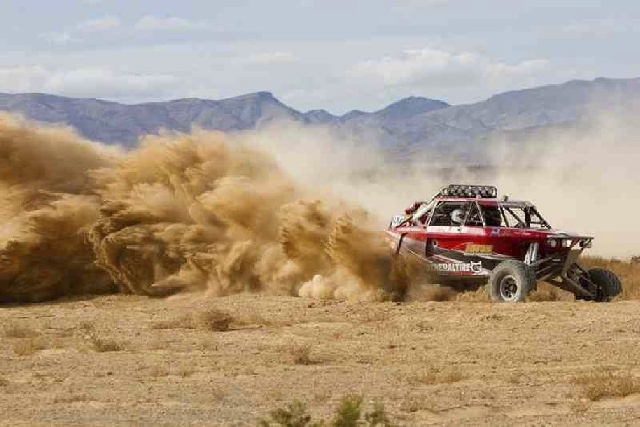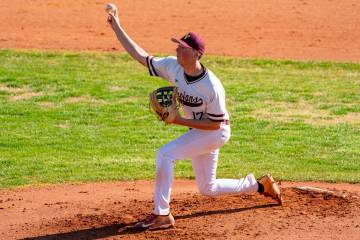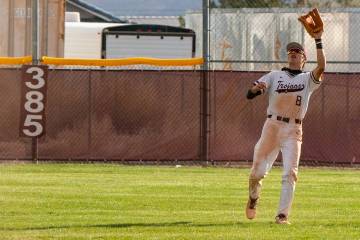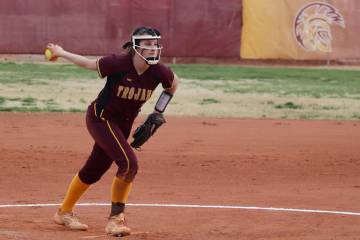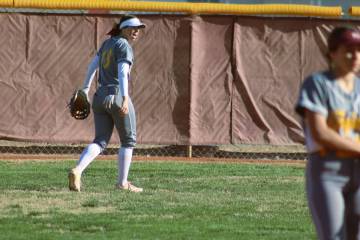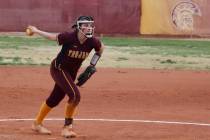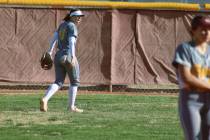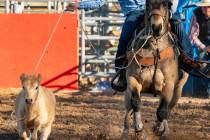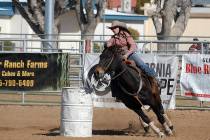VEGAS TO RENO:Father and son team go for three in a row
A Father and son team are out to smash the competition this year at the General Tire Vegas to Reno Race.
Garrick Freitas and his Father Danny have done well in this race for the past two years.
Vegas to Reno is the longest off-road race in North America at 550 grueling miles through the Mojave Desert.
The team will be going for their third win in class and second win overall. Last year they won overall and took first in class and in 2011 they were second overall and first in class.
Garrick is the driver for the team while Danny navigates. The pair, from Visalia, Calif., have been doing this since 2010.
Team Freitas drives a 700-horsepower beast built by Jimco. The small-block Chevy engine has 427cc and sits on 37-inch tires. They race in the 1500 or dune buggy class.
The vehicle is far from being green and gets 2-1/2 to 3-1/2 miles per gallon. In the 550-mile course, it translates to a 127-mile range and four pit stops.
Another interesting design aspect of the vehicle is how it copes with the large amounts of dust generated during the race. The air for the engine is pulled from the cockpit, which is a bit cleaner, before it runs through the air filters.
The car is fuel injected, but because this race starts off at 115 degrees in the desert, Garrick runs a different fuel so the engine runs cooler.
The car also has five different coolers to deal with engine heat. There are primary and secondary coolers for engine oil and primary and secondary coolers for the torque converter in addition to the radiator.
Garrick said the Trick-Truck class may get all the glory, but the challenge for him is still to drive a buggy in the race.
“My car has 23 inches of travel from front to rear,” he said. “My car is lighter and more nimble and yet it is not going to have the Cadillac-plush ride the trucks do. Also, the weight helps the truck with the deep holes. The more weight, the bigger the parts and they are more expensive. We still do the same speeds. A buggy can be more difficult to drive with the rear engine.”
The Freitas team is composed entirely of volunteers, up to 30 personnel on race day.
Garrick said he has six core team members that come by his house in between races to get the car ready for race day.
“I have a shop behind my house and we spend Tuesday nights working on the car,” Garrick said. “Every Tuesday night the six guys get off work and come over about 5 p.m. to work on the car. Out of the six people, four of us are related. The other two are close friends.”
Garrick emphasized having a day job.
“We all have to work day jobs and this racing costs money,” he said. “I would say out of the whole sport, there only about two to three guys making a living out of it. About 99 percent of the sponsors pay directly to the program and are not a value to the driver. General Tire helps me out with all my tires, and a local fuel distributor, where I live, pays for all my fuel. The race will eat up eight tires from wear and that is at $400 a piece. I will start out with four and will change out the rear tires twice.”
To win this year’s race Freitas said the team will have to shave off time wherever they can.
“If you want to win a race it will not only take good equipment, but it is going to take some luck. Last year we won first overall by just 27 seconds,” he said.
The key to safety on this race is staying alert and having a good navigator. The navigator alerts the driver to pre-programmed dangers in the course. In between races, the driver and navigator prepare for the next race by driving the course and programming the hazards into the GPS. For example, if they find a large ravine on the course, it could get a large skull and crossbones icon in the GPS system.
In the Vegas to Reno Race, the teams will not get to drive the course because the BLM changes the course every year and keeps driving on the course to a minimum. The Best in the Desert race organizers drive the course for the drivers.
To emphasize the importance of staying alert, Freitas discussed a serious accident he had in 2010 which almost claimed his life.
“We hit a ravine wrong and we cartwheeled the car five times,” he said. “We walked away from that car because of the safety gear, the five-point harness and the special shock-absorbing seats saved us.
We were going over 90 mph when we hit a ravine, but because of the weight of the engine in the back we just did not have enough air to clear it. Moments later a truck came and we tried to warn the driver by waving him off. He was going faster, maybe 120 mph and he cartwheeled his vehicle, too. The navigator did not fare well and had to be airlifted to the hospital.”


